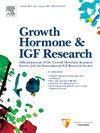Efficacy, safety, and outcomes of growth hormone treatment in children with idiopathic short stature
IF 1.6
4区 医学
Q4 CELL BIOLOGY
引用次数: 0
Abstract
Background
Growth hormone (GH) is a treatment option in some countries for children with idiopathic short stature (ISS) given to enable them to attain height within the expected range. Currently, it is not often utilised in clinical practice. A literature review was conducted to summarise the efficacy, safety, and outcomes associated with GH treatment in children with ISS.
Summary
Guidelines for the diagnosis and treatment of ISS may benefit from revision to accommodate recent findings on genetic factors that influence height. Clinical trials and observational studies designed to investigate the effect of GH treatment on children with ISS have shown that it is effective in enabling them to attain height within the normal range. In some instances, height improvements are reported up to adult height. The safety of GH treatment in this patient population has also been investigated and no new safety concerns have been observed. In analyses that were designed to investigate the effect of GH on quality of life, improvements in psychosocial scores were observed, either by the patient, parent, or the treating physician.
Key message
GH treatment is effective in improving height outcomes and quality of life in children with ISS, with an acceptable safety profile.
生长激素治疗特发性矮小儿童的疗效、安全性和结局
在一些国家,生长激素(GH)是特发性身材矮小(ISS)儿童的一种治疗选择,用于使他们达到预期范围内的身高。目前,它在临床实践中并不常用。一篇文献综述总结了生长激素治疗ISS患儿的有效性、安全性和相关结果。摘要:ISS的诊断和治疗指南可能会受益于修订,以适应影响身高的遗传因素的最新发现。旨在调查生长激素治疗对ISS儿童影响的临床试验和观察性研究表明,它能有效地使他们达到正常范围内的身高。在某些情况下,身高的提高可以达到成人的身高。生长激素治疗在这一患者群体中的安全性也进行了调查,没有观察到新的安全问题。在旨在调查生长激素对生活质量影响的分析中,无论是患者、父母还是治疗医生都观察到心理社会评分的改善。关键信息:egh治疗可有效改善ISS患儿的身高结局和生活质量,并具有可接受的安全性。
本文章由计算机程序翻译,如有差异,请以英文原文为准。
求助全文
约1分钟内获得全文
求助全文
来源期刊

Growth Hormone & Igf Research
医学-内分泌学与代谢
CiteScore
3.30
自引率
0.00%
发文量
38
审稿时长
57 days
期刊介绍:
Growth Hormone & IGF Research is a forum for research on the regulation of growth and metabolism in humans, animals, tissues and cells. It publishes articles on all aspects of growth-promoting and growth-inhibiting hormones and factors, with particular emphasis on insulin-like growth factors (IGFs) and growth hormone. This reflects the increasing importance of growth hormone and IGFs in clinical medicine and in the treatment of diseases.
 求助内容:
求助内容: 应助结果提醒方式:
应助结果提醒方式:


